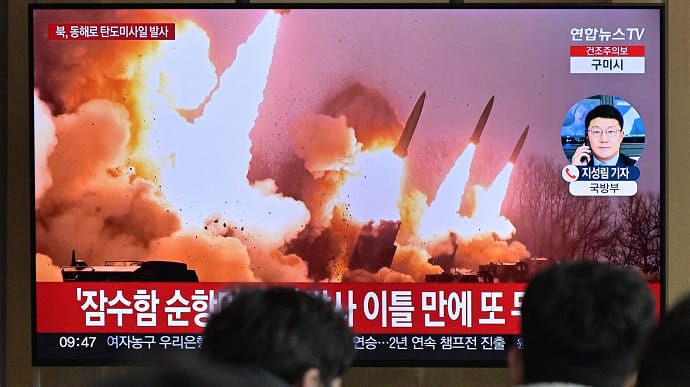Russia looks for ballistic missiles abroad as they are more effective in bypassing air defence systems – ISW
Russia is intensifying its efforts to buy ballistic missiles from abroad, as these missiles are more effective in hitting targets in Ukraine under certain circumstances. Source: Institute for the Study of War (ISW) Details: ISW's military analysts have noted that Russian forces regularly use short-range ballistic missiles to strike Ukrainian cities located closer to the front line, and these missiles are more effective at passing through or bypassing Ukrainian air defence systems.

Russia is intensifying its efforts to buy ballistic missiles from abroad, as these missiles are more effective in hitting targets in Ukraine under certain circumstances.
Source: Institute for the Study of War (ISW)
Details: ISW’s military analysts have noted that Russian forces regularly use short-range ballistic missiles to strike Ukrainian cities located closer to the front line, and these missiles are more effective at passing through or bypassing Ukrainian air defence systems.
Ukrainian air defence systems have intercepted 149 of the 166 Russian cruise missiles reportedly launched since 29 December 2023, but they have intercepted only a handful of the ballistic missiles that Russia launched at Ukraine over the same period.
Russian forces have repurposed S-300 and S-400 anti-aircraft missiles to strike ground targets in Ukraine, and Ukrainian officials have acknowledged that Ukrainian air defence has struggled to intercept these unconventional missile attacks using their own S-300 systems.
Ukrainian forces have also been less successful in intercepting Iskander ballistic missiles in recent strikes, although they did intercept an Iskander-M missile during a less intense series of Russian missile and drone strikes on 30 December. In addition, Ukrainian forces intercepted all Iskander-M or S-300/S-400 missiles that Russian forces launched at Kyiv on 12 December.
According to official reports, Ukrainian forces also intercepted all 10 Kinzhal missiles that Russian forces launched at Ukraine on 2 January, using Patriot systems. Thus, the effectiveness of Russian ballistic missiles partly depends on the configuration of Ukraine's air defence system and on the strike system of which the missiles are a part.
The relative success that Russian forces have had in hitting targets in Ukraine with ballistic missiles, in combination with cruise missiles and drones, may encourage Russia to intensify its efforts to acquire ballistic missiles from abroad. Russia can produce approximately 42 Iskander missiles and 4 Kinzhal missiles per month, although it is unclear how many S-300/S-400 missiles Russia can produce.
Additionally, Russia's defence industrial base cannot produce ballistic missiles on the scale required for a sustained campaign of strikes against Ukraine that relies on the regular use of large numbers of ballistic missiles, and Russia would likely have to source ballistic missiles from abroad if it wanted to sustain large-scale missile strikes against Ukraine.
To quote the ISW’s Key Takeaways on 4 January:
- Ukrainian military officials reported that Ukrainian forces struck at least one Russian military target in occupied Crimea, while Russian officials and milbloggers claimed that the Ukrainian strike was unsuccessful.
- US National Security Council Spokesperson John Kirby stated on 4 January that Russia has already launched ballistic missiles acquired from North Korea at targets in Ukraine and continues efforts to acquire similar missiles from Iran.
- Russia may be intensifying efforts to source ballistic missiles from abroad because these missiles appear to be more effective at striking targets in Ukraine in some circumstances.
- US National Security Council Spokesperson John Kirby dismissed recent Western reporting of Russian President Vladimir Putin’s willingness to engage in peace negotiations with Ukraine as "ballyhoo" during a press conference on 3 January.
- Russian President Vladimir Putin signed a decree strengthening procedures for granting foreign citizens Russian citizenship in exchange for Russian military service in Ukraine, likely as part of ongoing efforts to coerce migrants into the Russian military.
- Kyrgyzstan sentenced a Kyrgyz citizen to five years in prison for participating in the war in Ukraine as a member of the Wagner Group.
- Russia has begun negotiations with Algeria, the United Arab Emirates (UAE), and Saudi Arabia to open Russian cultural centres (Russkii dom) abroad, likely aimed at increasing Russian influence in the Middle East and North Africa.
- Russian forces made confirmed advances near Kreminna and Avdiivka as positional engagement continued along the entire frontline.
- Ukrainian sources reported that Russian authorities are planning to mobilise Ukrainian teenagers living in occupied Ukraine.
- Russian President Vladimir Putin signed a decree on 4 January streamlining the process for certain Ukrainians to receive Russian citizenship.
Support UP or become our patron!


